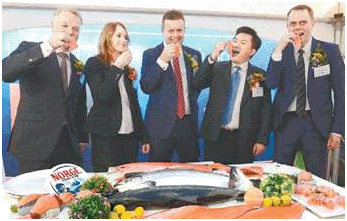
Market Information > Food News Clipping
Food News Clipping
October 11, 2013
2013.10.17
1. LIVESTOCK ISSUES
Imported beef¡¯s Distribution Label System still has Long Way to Go [Korean, LSH]
http://news.inews24.com/php/news_view.php?g_serial=776229&g_menu=022600&rrf=nv
Summary: Distribution labeling system for imported beef does not seem to operate well in market and small businesses. Customers Union of Korea (CUK) reported that after investigating 705 items, they could find 89.2% had correct labels, while remaining had disaccording track down records, which means that one out of ten did not reveal identification number. Especially, small markets had more products with incorrect labels than supermarkets of bigger size. The union said that they will demand related institutions for measures to improve the issue.
Warning Signs ahead for the Food Security of Imported Beef [Korean, LSH]
http://www.kyeonggi.com/news/articleView.html?idxno=711530
Summary: Safety issues on imported beef are gaining public attention as the number of products that disqualify the import criteria increased sharply. Beef products that were originally prohibited from importing due to danger of mad cow disease were found to be imported. Moreover, metal substances that might harmful to human body were found in imported beef including U.S. beef. The government considered this as a serious matter and decided to disqualify the whole import volume of same product detected. Fifty seven cases of importing spoiled beef (225 tons) were detected since 2008.
Zilpaterol Detected in U.S. Imported Beef [Korean, LSH]
http://www.seoulfn.com/news/articleView.html?idxno=176119
Summary: According to the Ministry of Food and Drug Safety (MFDS), ¡®Zilpaterol¡¯ was detected in U.S. imported beef produced in SWIFT BEEF Cooperation¡¯s operation channel. Zilpaterol is a animal additive used to expedite growth of livestock. When consumed by human, it can cause increased cardiac impulse and bronchiectasis. Korean government decided to prohibit the beef import from pertinent SWIFT BEEF Company and will require further investigation on the matter.
Sales of U.S. Beef in Korean Market Decreases even after FTA [Korean, LSH]
http://www.newsis.com/ar_detail/view.html?ar_id=NISX20131008_0012418458&cID=10408&pID=10400
Summary: It is reported that the sales volume of U.S. beef in Korea is continuously decreasing even after the FTA is ratified. The main reason behind this phenomenon is that the price of imported beef keeps rising while domestic beef price decreased due to increase in supply. FTA does not seem to contribute to reduction of price thereby failing to attract consumers to buy more U.S imported product. Developing Chinese economy and market in the near future will also create rising demand which will draw up the international beef price and lower Korean consumers¡¯ demand in the end.
2. MARKETING ISSUES
Norway Salmon Supplier Opens Processing Plant in Incheon Korea as Demand in Korea Surges due to Korean Consumers¡¯ Radioactivity Concerns for Japanese and Korean Seafood [Korean, OSY]
http://news.donga.com/3/all/20131010/58110156/1

MFDS Tests have Found Risky Agricultural Chemicals in 881 Tons of Coffee Beans imported over the Past Two Years ¡¦ But No Beans were Rejected as Korean Residue Safety Ceiling were 100 – 200 Times Higher than Reference Countries such as Japan and the U.S. [Korean, OSY]
http://news.naver.com/main/read.nhn?mode=LSD&mid=sec&sid1=102&oid=001&aid=0006523273
Summary: According to Korea Ministry of Food & Drugs Safety (MFDS) data submitted to the National Assembly, 47 shipments of coffee beans imported into Korea since 2011 tested positive for risky agricultural chemicals. However, Korean safety ceilings on the chemicals were as much as 200 times higher than Japan or American standards. MFDS data indicated that 31 of the shipments in question would have been rejected for imports if American standards were applied. MFDS explained that because Korean¡¯s average intake volume of coffee is much lower than American or European people, the residue ceiling for the agricultural chemicals is set comparatively higher than those high coffee consuming countries.
3. OTHER MISCELLANEOUS ISSUES
Only 0.2% of Food Producers Participate in Food Traceability System after 5 Years of Implementation [Korean, LSH]
http://www.yakup.com/news/index.html?mode=view&cat=11&nid=167809
The information in this report was compiled by the Agricultural Trade Office (ATO) at the U.S. Embassy in Seoul, South Korea. The press summaries contained herein do NOT reflect USDA, the U.S. Embassy, or other U.S. government agency official policy or view point. U.S. food exporters can learn more about market opportunities in South Korea by reviewing ATO Seoul¡¯s Exporter Guide and other reports available at www.fas.usda.gov by clicking on ¡°attaché reports
Agricultural Trade Office, U.S. Embassy - Seoul
Tel: 82-2-6951-6848 Fax: 82-2-720-7921
Email: atoseoul@state.gov